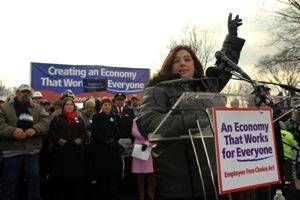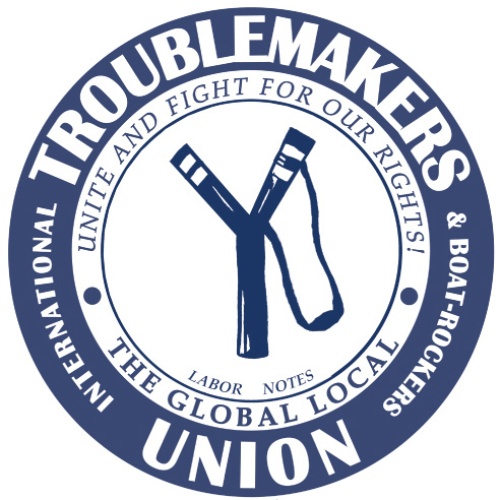VOICES: The labor law reform we need

By Rand Wilson, Labor Notes
When the next opportunity for labor law reform arrives, union membership will be smaller and our political clout even more diminished. If we are to succeed, future reform proposals must be wrapped in a broader mantle that will appeal to all workers.
The four-year drive for the Employee Free Choice Act was the single largest union-backed campaign in decades and it succeeded in uniting the labor movement as never before. I doubt there was a steward in the country who wasn't familiar with EFCA and why we needed it.
The proposed law, which so many members fought for between 2006 and 2010, would have made it faster and easier for workers to gain union recognition through card check, created stiffer penalties for employers who violate labor laws, and helped workers win difficult first contracts through binding arbitration.
Many union leaders believed EFCA to be labor's last opportunity to address the obstacles to recruiting new members and a rebirth of the labor movement.
While campaigning for EFCA was easy among union members, once we ventured beyond our ranks it was a much harder sell.
With faith in democracy deeply ingrained in the national psyche, it was almost impossible to convince the general public that card check was as democratic as a secret ballot election. Every time the opposition yelled, "Union bosses want to take away your right to vote," we were put on the defensive and our allies floundered.
So while EFCA appealed to union members and a small population of workers who imagined they might one day like to join a union, it appeared to the public as a narrow "special-interest" labor bill.
The demise of EFCA closely resembled the fate of other reform bills backed by the labor movement: one against permanent striker replacement (1993); a bill for speedier elections, greater union access during organizing drives, and relief for illegally fired workers (1978); and repeal of Taft-Hartley (1966), where we could not stop a filibuster in the Senate.
Winning though smaller
Past reforms led by the labor movement have won minimum wage, health and safety regulations, child labor laws, and prohibitions against discrimination. And whenever the labor movement was on the offensive fighting for all workers, union membership grew.
What’s left to achieve that might inspire all workers -- union and non-union alike?
"Employment security" could be the remaining frontier. A campaign to pass state laws requiring “just cause” before a worker is fired could also spur union growth, since one of the top reasons workers are afraid of organizing is the knowledge they are likely to be terminated.
Our existing laws have not diminished workers' fears because the procedures are too uncertain and lengthy (two to three years at the Labor Board and another two years in the courts) to provide any assurance. Winning state "just cause" laws that allow cases to be decided quickly by arbitrators might give workers more confidence.
As described in Clyde Summers's important 1976 Virginia Law Review article on the topic, the United States is alone among industrialized countries in allowing at-will employees to be terminated for arbitrary reasons. Because of union protests and aggressive legal action, Germany, France, Japan, Sweden, the United Kingdom, and South Africa require employers to have a just cause to dismiss non-probationary employees.
One state has also passed such a law. The Montana Wrongful Discharge from Employment Act was passed in 1987. Applicable to non-union non-probationary employees, it prohibits discharges without good cause, allows workers to sue for up to four years of back pay, and provides a way for workers to recover attorneys’ fees.
Despite fear-mongering by opponents, the Big Sky state’s robust economic growth has not been affected. Statutes in Puerto Rico and the Virgin Islands also prohibit termination without "good cause."
Championing everyone
Winning "just cause" legislation will certainly not be easy. But building a movement on a similar scale to the effort put behind EFCA would offer union activists an opportunity to champion an issue that would benefit all workers and also help union growth.
A "just cause" campaign could potentially engage working people at many levels. Short of state or federal legislation, local unions, central labor councils, and worker centers could seek to enforce a just cause standard through workers' rights boards and community pressure.
Communities could declare certain areas "Just Cause Zones" and fight to enforce just cause as a community standard -- like living wage laws, but potentially much wider. Political activists could use the proposed legislation as a litmus test for candidates. We could hold hearings on the need for just cause and lobby state legislatures.
If just cause campaigns succeed, workers will have more security to participate in organizing drives. Montana's unionization rate reflects its mix of industries and history of militant struggles, but it's hard not to notice that the state, at 14.6 percent, has a healthier percentage of union members than the national average. Neighboring Idaho has less than half the rate of unionized workers.
Even if campaigns for just cause do not succeed, they would be an opportunity to educate millions of not-yet-union workers about the concept (especially if the campaign used ballot referendums) and the increased job security it could bring to their lives.
By popularizing the just cause concept and raising expectations, more workers may respond by thinking, "If we can't get this protection through the legislature, let's get it by forming a union!"
(Rand Wilson is organizing director for Service Employees Local 888 in Boston. Transport Workers Union photo of EFCA rally via Labor Notes.)
Tags
Labor Notes
Labor Notes is a media and organizing project that has been the voice of union activists since 1979.
